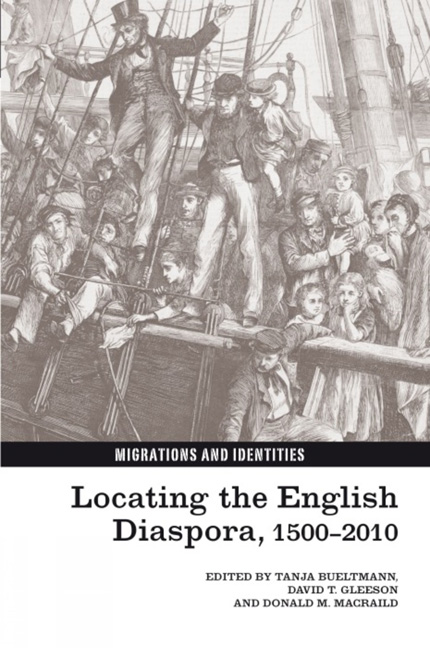Book contents
- Frontmatter
- Contents
- Notes on Contributors
- Introduction. Locating the English Diaspora: Problems, Perspectives and Approaches
- 1 Mythologies of Empire and the Earliest English Diasporas
- 2 The English Seventeenth Century in Colonial America: The Cultural Diaspora of English Republican Ideas
- 3 Fox Hunting and Anglicization in Eighteenth-Century Philadelphia
- 4 The Hidden English Diaspora in Nineteenth-Century America
- 5 An English Institution? The Colonial Church of England in the First Half of the Nineteenth Century
- 6 The Importance of Being English: English Ethnic Culture in Montreal, c.1800–1864
- 7 Anglo-Saxonism and the Racialization of the English Diaspora
- 8 ‘The Englishmen here are much disliked’: Hostility towards English Immigrants in Early Twentieth-Century Toronto
- 9 Cousin Jacks, New Chums and Ten Pound Poms: Locating New Zealand's English Diaspora
- 10 ‘Cooked in true Yorkshire fashion’: Regional Identity and English Associational Life in New Zealand before the First World War
- 11 Englishness and Cricket in South Africa during the Boer War
- 12 An Englishman in New York? Celebrating Shakespeare in America, 1916
- 13 The Disappearance of the English: Why is there no ‘English Diaspora’?
- Index
Introduction. Locating the English Diaspora: Problems, Perspectives and Approaches
- Frontmatter
- Contents
- Notes on Contributors
- Introduction. Locating the English Diaspora: Problems, Perspectives and Approaches
- 1 Mythologies of Empire and the Earliest English Diasporas
- 2 The English Seventeenth Century in Colonial America: The Cultural Diaspora of English Republican Ideas
- 3 Fox Hunting and Anglicization in Eighteenth-Century Philadelphia
- 4 The Hidden English Diaspora in Nineteenth-Century America
- 5 An English Institution? The Colonial Church of England in the First Half of the Nineteenth Century
- 6 The Importance of Being English: English Ethnic Culture in Montreal, c.1800–1864
- 7 Anglo-Saxonism and the Racialization of the English Diaspora
- 8 ‘The Englishmen here are much disliked’: Hostility towards English Immigrants in Early Twentieth-Century Toronto
- 9 Cousin Jacks, New Chums and Ten Pound Poms: Locating New Zealand's English Diaspora
- 10 ‘Cooked in true Yorkshire fashion’: Regional Identity and English Associational Life in New Zealand before the First World War
- 11 Englishness and Cricket in South Africa during the Boer War
- 12 An Englishman in New York? Celebrating Shakespeare in America, 1916
- 13 The Disappearance of the English: Why is there no ‘English Diaspora’?
- Index
Summary
From the early seventeenth century, when sustained migrations began a process of re-peopling in the emerging colonies of settlement, emigrants from the British and Irish Isles outnumbered those from any other European nation. Methods of counting frustrate the historian of the English: over the four centuries from the earliest migrations until the outbreak of the Second World War, those living in the colonies or the United States who had been born in England or were of English extraction exceeded those from Scotland and Ireland, but it is impossible to disentangle the English from the British. This remained a problem in the second half of the nineteenth century, and was compounded by the fact that many who left from English ports were not English themselves. But indicative emigration rates point to the continued importance of English people as a source for New World populations. While in the period from 1881 to 1910 Scotland was losing between seven and ten people per thousand of population, and Ireland between seven and fourteen, the much larger population of England was producing more emigrants, albeit at the lower rate of between five and six per thousand. Yet while the significance of the English has been noticed by historians of emigration, it is not acknowledged by historians of ethnicity: scholars recognize the English as a key population source in the Anglophone world but say relatively little about their contribution as immigrant communities.
In the United States, Charlotte Erickson studied the English but ultimately labelled them ‘invisible’. Bernard Bailyn consciously overlooked them since they did not qualify as marginal in the first British Empire. Carl Wittke also chose to leave them out. Oscar Handlin, who saw migration as a disturbing ‘uprooting’ process, simply ignored them. The idea that the English might, like every other settler group, be an ethnic community is ignored or refuted.
- Type
- Chapter
- Information
- Locating the English Diaspora, 1500–2010 , pp. 1 - 14Publisher: Liverpool University PressPrint publication year: 2012



